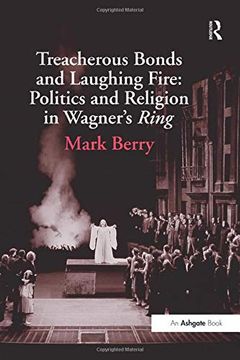Share
Treacherous Bonds and Laughing Fire: Politics and Religion in Wagner'S Ring (in English)
Mark Berry (Author)
·
Routledge
· Paperback
Treacherous Bonds and Laughing Fire: Politics and Religion in Wagner'S Ring (in English) - Mark Berry
$ 63.46
$ 66.99
You save: $ 3.53
Choose the list to add your product or create one New List
✓ Product added successfully to the Wishlist.
Go to My WishlistsIt will be shipped from our warehouse between
Tuesday, June 18 and
Wednesday, June 19.
You will receive it anywhere in United States between 1 and 3 business days after shipment.
Synopsis "Treacherous Bonds and Laughing Fire: Politics and Religion in Wagner'S Ring (in English)"
Mark Berry explores the political and religious ideas expounded in Wagner's Ring through close attention to the text and drama, the multifarious intellectual influences upon the composer during the work's lengthy gestation and composition, and the wealth of Wagner source material. Many of his writings are explicitly political in their concerns, for Wagner was emphatically not a revolutionary solely for the sake of art. Yet it would be misleading to see even the most 'political' tracts as somehow divorced from the aesthetic realm; Wagner's radical challenge to liberal-democratic politics makes no such distinction. This book considers Wagner's treatment of various worlds: nature, politics, economics, and metaphysics, in order to explain just how radical that challenge is. Classical interpretations have tended to opt either for an 'optimistic' view of the Ring, centred upon the influence of Young Hegelian thought - in particular the philosophy of Ludwig Feuerbach - and Wagner's concomitant revolutionary politics, or for the 'pessimistic' option, removing the disillusioned Wagner-in-Swiss-exile from the political sphere and stressing the undoubtedly important role of Arthur Schopenhauer. Such an 'either-or' approach seriously misrepresents not only Wagner's compositional method but also his intellectual method. It also sidelines inconvenient aspects of the dramas that fail to 'fit' whichever interpretation is selected. Wagner's tendency is not progressively to recant previous 'errors' in his oeuvre. Radical ideas are not completely replaced by a Schopenhauerian world-view, however loudly the composer might come to trumpet his apparent 'conversion'. Nor is Wagner's truly an Hegelian method, although Hegelian dialectic plays an important role. In fact, Wagner is in many ways not really a systematic thinker at all (which is not to portray him as self-consciously unsystematic in a Nietzschean, let alone 'post-modernist' fashion). His tendency, rather, is agglomerative,
- 0% (0)
- 0% (0)
- 0% (0)
- 0% (0)
- 0% (0)
All books in our catalog are Original.
The book is written in English.
The binding of this edition is Paperback.
✓ Producto agregado correctamente al carro, Ir a Pagar.

